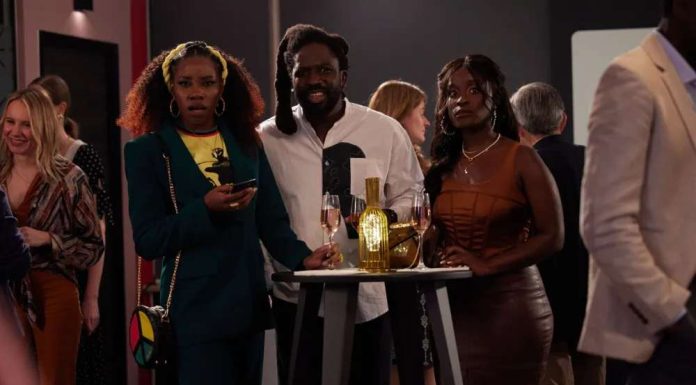“Dreaming Whilst Black” stands out as a trailblazing series that audaciously explores the structural problems encountered by Black filmmakers in a world where diversity in storytelling is progressively gaining center stage. Due to its realistic depiction of the challenges faced by young Black directors in the film industry, this British series, co-produced by A24, BBC, and Big Deal Films, has received much notice. “Dreaming Whilst Black” is more than just a television program; it is an insightful assessment of the challenges faced by Black creatives in their pursuit of cinematic brilliance. It was adapted from an online series that found its way to the BBC Three pilot.
[2023] Dreaming Whilst Black Episode 1 Recap
Dreaming While Black Series Story
The sitcom “Dreaming Whilst Black” is co-created and co-written by Adjani Salmon, who plays the role of Kwabena, an aspiring filmmaker. Kwabena is imprisoned in a depressing career recruitment office where he must deal with the loneliness of working with just other people of color. His experience at work is rife with microaggressions, which is a brutal reality for many Black professionals trying to make it in largely white workplaces.
The show focuses on Kwabena’s life away from work, where he lives with his cousin and buddy Maurice and Funmi (Rachel Adedeji), Maurice’s wife. Kwabena is fervently pursuing his goal of making his movie, “Jamaica Road,” here. His route is however paved with difficulties. Due to his lack of expertise and financial resources, he has trouble finding directing employment. Additionally, the white decision-makers he meets lack empathy for his situation.
His unshakeable commitment to his day work, which frequently conflicts with his artistic aspirations, is one of the most pressing difficulties Kwabena faces. When he runs into Amy (Dani Moseley), a former college classmate who now works in the production sector, this internal conflict comes to the fore. The chance presented by Amy’s offer to put him in touch with studio executives is crucial, but Kwabena’s concern about the effects on his employment causes him to make a terrible choice that will follow him throughout the series.
“Dreaming Whilst Black” emphasizes the value of both creative and personal integrity in addition to focusing on the difficulties faced by a new filmmaker. The show illustrates how creativity can be hampered by the fear of giving up one’s artistic vision in the name of financial security. A crucial question emerges as we delve into the compelling story of “Dreaming Whilst Black”: Does this series have its roots in real events? The history of this astonishing program and its relationship to the real-life events that pervade the film business will be revealed in the sections that follow (tvacute.com).
Is Dreaming While Black Based on a True Story?
“Dreaming Whilst Black” takes its inspiration from real-life experiences and challenges faced by Black individuals in the entertainment industry. While the series itself is not autobiographical, it draws upon the collective experiences of Black professionals working in entertainment.
The show doesn’t hold back when discussing the difficulties of living as a person of color in a world that is largely made up of white colonizers. It sheds light on the major microaggressions that are all too typical in the Black diasporic experience through its characters and events.
For instance, in the episode’s opening, Kwabena instructs his white coworker, Adam, on how to pick a movie to watch on a first date with a Black woman. The movies “The Color Purple,” “Precious,” and “12 Years a Slave,” all of which depict the rape of Black women, are Adam’s early recommendations. Kwabena’s remark emphasizes how critical it is to be sensitive and knowledgeable about how people of color are portrayed in the media.
Adjani Salmon, along with co-authors Ali Hughes and Yemi Oyefuwa, created these fearless, perceptive, and biting scenarios that combine cultural allusions with commonplace observations. This combination produces a potent statement on the difficulties in producing Black cinema that is appealing to a wide audience. It emphasizes the importance of producing truthful, ethical stories that respect the perspectives of underrepresented communities.
Despite not being a documentary, “Dreaming Whilst Black” captures the essence of the difficulties faced by Black filmmakers, which gives it authenticity. While the series may not be a direct adaptation of a single true story, it is a composite of the stories, struggles, and aspirations of many. It acts as a mirror for the sector, reflecting the structural barriers that still stand in the way of advancement and representation. In doing so, the series appeals to everyone who is devoted to diversity and inclusivity in the entertainment industry, not only Black creatives.
In conclusion, “Dreaming Whilst Black” is a gripping and provocative series that uses its fictitious story to highlight issues facing real-world people. Important conversations regarding representation, authenticity, and the difficulties experienced by Black professionals in the film industry can be had on this forum. It may not be a true story in the classic sense, but it is unmistakably based on the realities of a sector that is still battling diversity issues.
Is Netflix’s Burning Body Based on Real Events?







